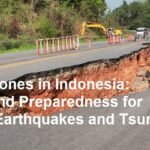Earthquakes can strike suddenly and without warning, causing significant damage and danger. Knowing how to stay safe during and after an earthquake is crucial to protect yourself and others. Here are essential tips to help you prepare, respond, and recover safely.
Before an Earthquake
Preparation is key to minimizing risks during an earthquake. Some important steps include:
- Create an Emergency Plan:Discuss with your family or household where to meet if separated and how to communicate after the quake.
- Secure Your Home:Fasten heavy furniture, shelves, and appliances to walls or floors to prevent tipping. Place heavy or fragile items on lower shelves.
- Know How to Shut Off Utilities:Learn how to turn off gas, water, and electricity in case of leaks or damage.
- Prepare an Emergency Kit:Include essentials like water, non-perishable food, flashlight, batteries, first aid supplies, medications, and important documents.
- Practice Drills:Regularly practice “Drop, Cover, and Hold On” drills so everyone knows what to do when shaking starts.
What to Do During an Earthquake
If you feel the ground shaking, follow these safety actions immediately:
- Stay Calm:Panic can cause injuries. Take deep breaths and focus on protecting yourself.
- If Indoors:
- Drop, Cover, and Hold On:Drop to your hands and knees, cover your head and neck with your arms, and if possible, take shelter under a sturdy table or desk.
- Stay Away from Windows and Glass:Move away from windows, glass doors, mirrors, and anything that could shatter.
- Avoid Doorways:Contrary to popular belief, doorways are not the safest place unless you live in an old, unreinforced adobe house.
- Stay Put:Do not run outside during shaking; falling debris is a major hazard.
- If Outdoors:
- Move to an open area away from buildings, trees, streetlights, and power lines.
- Drop to the ground and protect your head and neck.
- If in a Vehicle:
- Pull over safely to the side of the road.
- Stay inside the vehicle until shaking stops.
- Avoid stopping under bridges, overpasses, or near power lines.
What to Do After an Earthquake
Once the shaking stops, take these steps to ensure safety and assist others:
- Check for Injuries:Provide first aid if needed. Do not move seriously injured people unless they are in immediate danger.
- Inspect for Hazards:Check for gas leaks, damaged electrical wiring, and water line breaks. If you smell gas, open windows, leave immediately, and report it to authorities.
- Avoid Using Open Flames:Do not light matches, candles, or turn on electrical switches until you are sure there are no gas leaks.
- Listen to Official Information:Use a battery-powered radio or phone to get updates and instructions from emergency services.
- Stay Clear of Damaged Buildings:Avoid entering buildings that may be structurally unsafe.
- Be Prepared for Aftershocks:These smaller tremors can follow the main quake and cause additional damage.
- Help Neighbors:Check on family, friends, and neighbors, especially those who may need assistance like the elderly or disabled.
- Use Phones Only for Emergencies:Keep lines open for emergency calls.
- Document Damage:Take photos or videos of any property damage for insurance claims.
Additional Tips
- Wear sturdy shoes to protect your feet from broken glass and debris.
- Keep emergency supplies accessible at all times.
- If you are trapped under debris, try to remain calm, cover your mouth to avoid dust inhalation, and signal for help by tapping or using a whistle.
By following these guidelines, you can significantly increase your safety and help others during the critical moments of an earthquake. Preparation, calmness, and quick action are your best tools to survive and recover.









